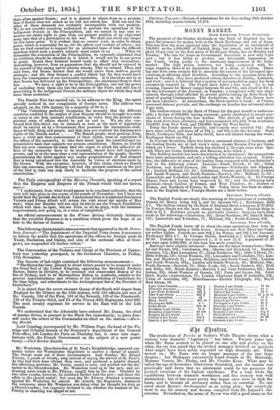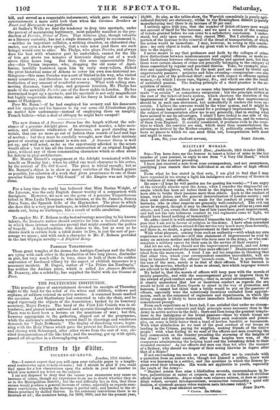J14 t *tuff.
The production of Pericles at Sadler's Wells Theatre shows what a curious turn dramatic " legitimacy " has taken. Twenty years ago, when Mr. Bunn seemed to be placed on one side and poetry on the other, the cry was raised that the wicked manager lavished on spectacle what might have been nobly expended on high dramatic art. Time moved on ; Mr. Bunn was no longer manager of the two large theatres ; but Shakspere successively found friends in Mr. Macready, Madame Vestris, Mr. Phelps, and Mr. Charles Kean. What may be called the age of decorative illustration flourished, and the maxim was practically laid down that no adornment could be too gorgeous for poetical creations of the highest excellence. For a long while the equilibrium between dramatic worthiness and fine scenery was well maintained ; but of late years poetry has begun once more to kick the beam, and to become an accessory rather than an essential. No one cared about Byron's Sardanapalus as an acting play ; but everybody went to see the scenery and dresses compiled from Dr. Layard's dis- coveries. Nevertheless, the name of Byron was still a good name on the
bill, and served as a respectable indorsement, which gave the evening's entertainment a more solid look than when the Corsican Brothers or Faust and Marguerite was performed. At Sadlees Wells we find the tendency to drop into spectacle, under the pretext of maintaining legitimacy, most palpably manifest in the pro- dnetion of Pericles, Prince of Tyre. That dubious play, though valuable as a literary curiosity, has not a single dramatic quality to recommend it, .—neither an important collision, a striking situation, an elaborated cha- racter, nor even a showy speech, that a vain actor (and there are such beings) would care to utter. Mr. Phelps, who plays Pericles, and always does his best with whatever part he undertakes, cannot for the life of him get above ten minutes of histrionic display out of a work above three hours long. But then, this same unaccountable Peri- cles—this Tyrian impostor, who, dropping the old name of Apol- lonius, lawfully bestowed upon him by early story-tellers, filched the great historical name of Athens to cover his own non-historical no- thingness—this same Pericles was a sort of Sinbad in his way, who visited many countries ; and therefore he serves as a capital pretext for the in- troduction of any amount of wonderful scenery. What with rolling seas, moving dioramas, tossed ships, and gorgeous interiors, Mr. Phelps has made of the unwieldy Per icles one of the finest sights in London. He has determined to get up a spectacle, and his spectacle is not only magnificent but highly respectable likewise, since all the finery is hooked on to the name of Shakapere.
Poor Mr. Bunn !—if he had employed his scenery and his danseuses and his spangles and his banners to rig out some old Elizabethan play, no matter how undramatic—instead of employing them on naughty French ballets—what a deal of obloquy he might have escaped !



























 Previous page
Previous page